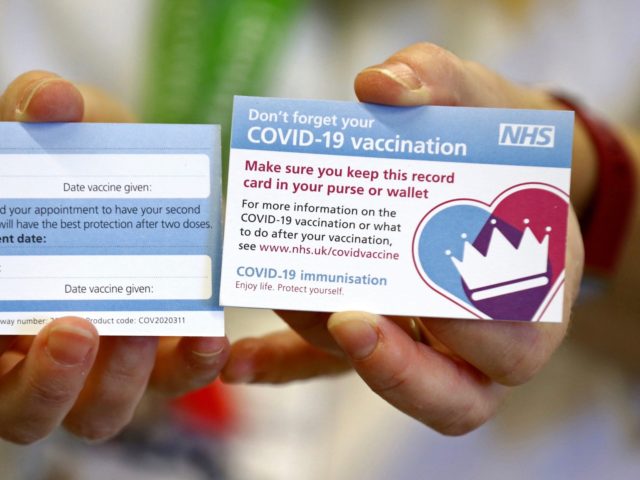The UK government has refused to rule out whether the coronavirus immunisation cards that will be handed out to those who have been vaccinated will be used as ‘immunity passports’ for everyday life.
Starting on Tuesday, the UK will embark on a massive vaccination push, with some 400,000 people expected to receive the first batch of injections.
Alongside the vaccination, Brits will receive an immunisation card that proves they have been injected.
The card, which will be issued by Britain’s socialised healthcare system, the National Health Service (NHS), instructs the carrier to “make sure you keep this record card in your purse or wallet”. Initially, the card reminds the bearer to present themselves at a later date for the second vaccine injection.
In an interview with Sky News on Monday, government minister James Cleverly refused to rule out whether the card will be used as an immunity passport to be used to enter into public venues, the latest government figure to give vague or obfuscating answers on the issue when pressed.
In response to the rollout of the immunisation cards, former Tory minister David Jones told the Daily Mail that the government needs to ensure that they are not used as passports for daily life, and even went on to suggest that Prime Minister Boris Johnson should enact legislation to prevent businesses from using them as such.
“It should be an entirely free decision [to carry a card]. I think people should be vaccinated but I don’t think they should be influenced by whether they can get into a restaurant or get into a theatre,” Jones said.
“That is the danger of having things like this. People may well be told, well you can’t come in unless you produce your card. I don’t think that is right,” he added.
Last week, the newly installed vaccine minister, Nadim Zahawi, suggested that British businesses will require the certificate, saying: “I think you’ll probably find many service providers will want to engage in this in the way they did with the [Test and Trace] app.”
The idea of an immunity passport was later denied by Cabinet Minister Michael Gove, who said: “I certainly am not planning to introduce any vaccine passports and I don’t know anyone else in government (who is),” Gove said.
Aside from immunity passports, Prime Minister Boris Johnson’s government has reportedly been working on “vaccine stamps” for British passports in order to supposedly facilitate international travel, as airlines such as Qantas have said that proof of immunity will be required for travel.
Last Wednesday, the local government of Wales announced that it would be providing similar immunisation cards to those who receive the vaccine.
Speaking against the measure, Grey Collier of the human rights campaign group Liberty, said that any form of coronavirus immunisation cards presents a threat to fundamental liberties, as they could easily be expanded by the government into full-on immunity passports.
“This could result in people who don’t have a card potentially being blocked from essential public services, work or housing – with the most marginalised among us hardest hit,” Collier warned.
On Tuesday, the government will embark on the mass vaccination scheme, after becoming the first Western nation to approve the COVID-19 vaccine developed by Pfizer and BioNTech. The initial rollout of the jab will focus on people over the age of 80, care home workers, and healthcare staff.
The National Health Service has officially confirmed in an advice pamphlet that pregnant women should avoid the vaccine until more information about possible side effects is understood. The advice also extended to women who hope to become pregnant in the near future, or are currently breastfeeding.
Last week, the Joint Committee on Vaccination and Immunisation (JCVI), which advises health departments in the UK on immunisation, said: “There are no data as yet on the safety of COVID-19 vaccines in pregnancy, either from human or animal studies. Given the lack of evidence, JCVI favours a precautionary approach, and does not currently advise COVID-19 vaccination in pregnancy.”
Follow Kurt Zindulka on Twitter here: @KurtZindulka

COMMENTS
Please let us know if you're having issues with commenting.